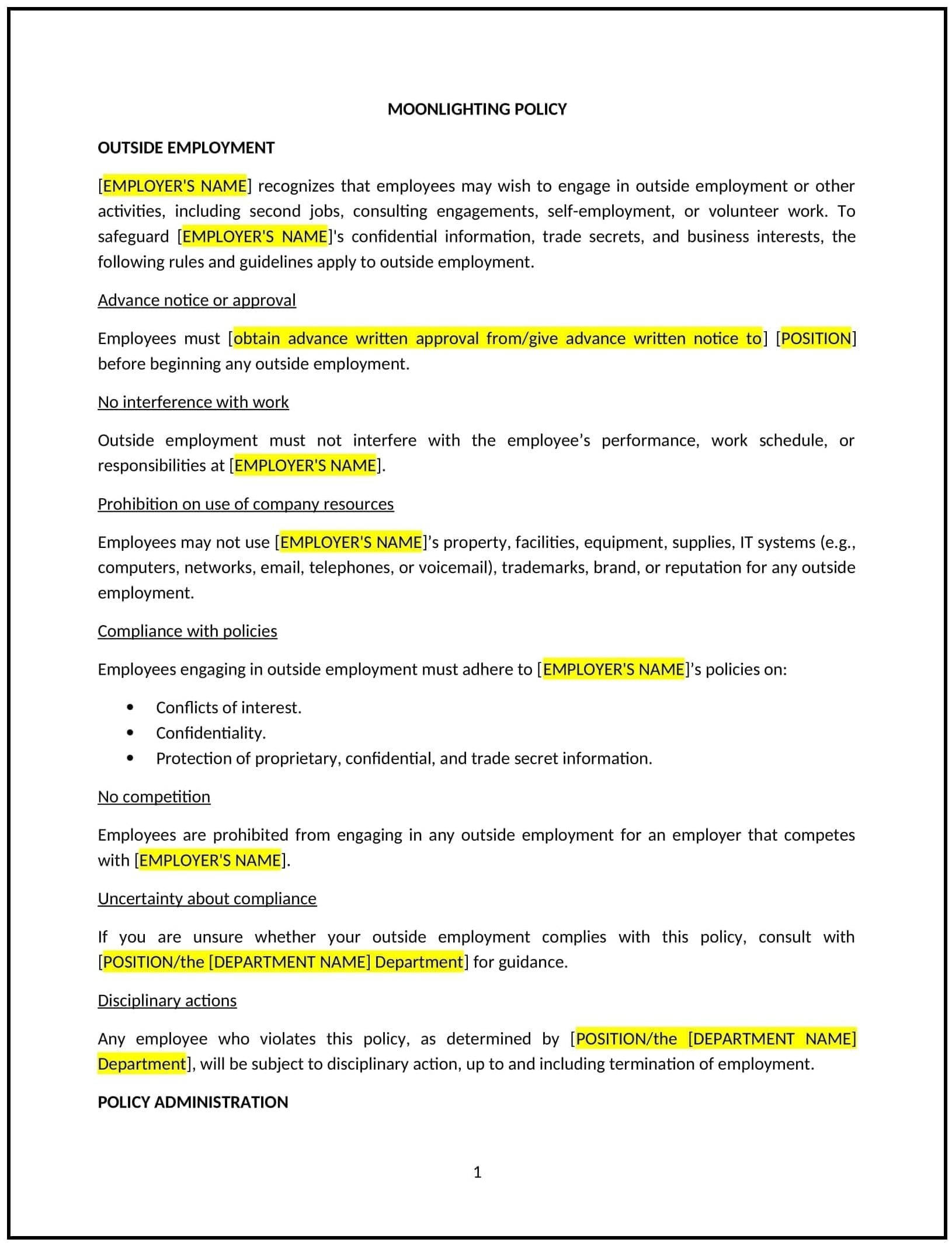Got contracts to review? While you're here for policies, let Cobrief make contract review effortless—start your free review now.

Customize this template for free
Moonlighting policy (Kansas)
A moonlighting policy helps Kansas businesses manage situations where employees take on additional work outside their primary employment. This policy defines the parameters for secondary employment, clarifying whether employees are permitted to take on outside jobs, and under what conditions, while ensuring that their work performance and company loyalty are not compromised.
By implementing this policy, businesses can prevent conflicts of interest, ensure focus on the company’s goals, and maintain a clear understanding of outside employment arrangements.
How to use this moonlighting policy (Kansas)
- Define secondary employment: Businesses should clearly outline what constitutes moonlighting or secondary employment, including freelance work, consulting, or any paid work outside the company.
- Establish disclosure requirements: Employees should be required to disclose any outside work, including the nature of the job, the hours worked, and the potential conflicts of interest it may create.
- Set performance expectations: Businesses should make it clear that outside work should not interfere with the employee’s primary job responsibilities, including job performance, attendance, and availability.
- Identify conflict of interest: Businesses should specify what types of outside work may be deemed a conflict of interest, such as working for a direct competitor or engaging in activities that could harm the business’s reputation.
- Set restrictions on hours: Businesses should establish guidelines on how many hours employees can work outside the company without impacting their primary responsibilities or violating any labor laws.
- Ensure job protection: Employees should be assured that they cannot be discriminated against or retaliated against for engaging in outside work, as long as it does not affect their performance or violate the policy.
- Review and update regularly: Businesses should review the policy periodically to ensure it aligns with changing labor laws, business needs, and employee expectations.
Benefits of using a moonlighting policy (Kansas)
- Reduces conflicts of interest: A clear policy helps businesses avoid potential conflicts that may arise from employees engaging in outside work that competes with or harms the company.
- Protects company time and resources: By managing moonlighting, businesses can ensure employees remain focused on their primary job duties and prevent the misuse of company time or assets.
- Ensures fairness: A transparent moonlighting policy ensures all employees are held to the same standards, reducing potential favoritism or unfair treatment.
- Increases employee trust: By allowing employees to engage in secondary employment under clear guidelines, businesses can build trust and demonstrate respect for employees' personal choices.
- Enhances legal protection: A formal policy reduces the risk of legal issues related to employees' outside work, especially regarding intellectual property, competition, and confidentiality.
- Boosts employee morale: Employees may appreciate the flexibility of secondary employment, knowing that the policy supports their right to earn additional income, as long as it does not affect their work performance.
Tips for using this moonlighting policy (Kansas)
- Communicate the policy clearly: Businesses should ensure that all employees are aware of the moonlighting policy and understand the process for disclosing outside work.
- Provide flexibility: The policy should allow employees to take on secondary jobs within reasonable limits, ensuring they can balance personal and professional commitments.
- Monitor performance: Businesses should regularly assess employee performance to ensure that outside work is not negatively impacting the employee’s primary responsibilities.
- Handle conflicts of interest carefully: If a conflict of interest arises, businesses should address the issue promptly and professionally, potentially reassigning tasks or projects to prevent issues.
- Offer support: Businesses can offer flexible work arrangements to employees with outside jobs, such as adjusting hours or workload, to ensure they can meet both personal and professional demands.
- Review the policy regularly: Businesses should periodically assess the moonlighting policy to ensure it aligns with current legal requirements and employee needs.